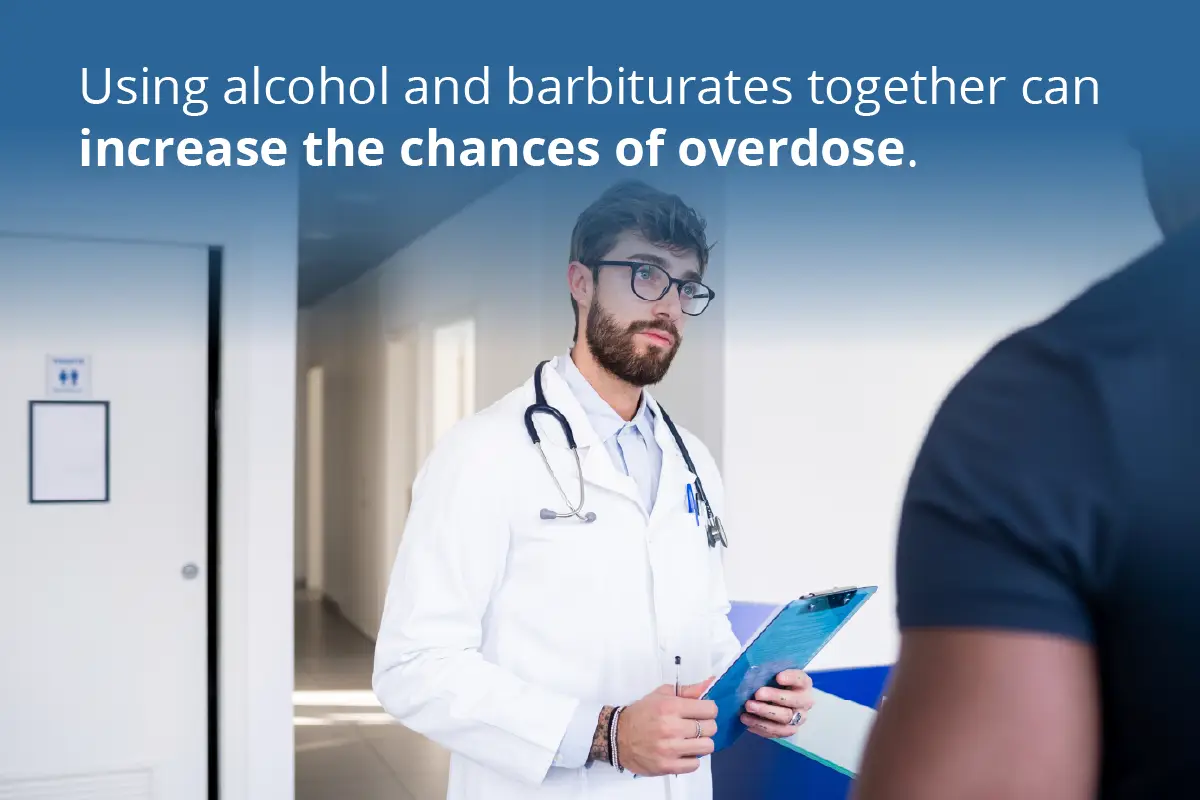
Mixing alcohol and barbiturates can be extremely dangerous.
One major risk is respiratory depression, where breathing slows down to a dangerous level. It can result in oxygen deprivation to the brain and other vital organs. The combination can also cause drowsiness and impaired coordination, increasing the likelihood of accidents or falls.
Both alcohol and barbiturates can impair cognitive function, leading to confusion and poor decision-making. Combining them heightens these effects, impacting judgment and increasing the risk of accidents or risky behaviors.
The mixture of alcohol and barbiturates can also increase the likelihood of overdose, which is a life-threatening situation. Signs of overdose include difficulty breathing, loss of consciousness, and, in severe cases, death.
It’s crucial to note that even small amounts of alcohol combined with barbiturates can be risky. If you’re prescribed barbiturates, it’s essential to talk to your healthcare provider about the potential dangers of alcohol interaction and strictly adhere to their recommendations.
Mixing both alcohol and barbiturates can increase sedation and pose severe risks. Here’s what you need to know:
Combining alcohol and barbiturates, both central nervous system depressants, intensifies sedation and poses severe risks. Their collective impact depresses vital functions like breathing and heart rate, potentially leading to unconsciousness, coma, or even death.
On the first day of your detox, you might experience a mix of physical and mental changes. Common symptoms include headaches, nausea, and fatigue. These are normal reactions as your body starts to adjust to the absence of alcohol. Remember to stay positive and keep focused on your goal.
To ease the alcohol detox process, keep yourself busy with gentle activities. Light exercise, like walking or stretching, can help improve your mood and energy levels. Try to engage in relaxing activities such as reading or listening to soothing music to keep yourself calm and distracted.
Eating a balanced diet is crucial during detox. Focus on consuming whole foods like fresh fruits, vegetables, and lean proteins. Avoid sugary and processed foods, as they can make alcohol withdrawal symptoms worse. Drinking plenty of water will also help flush out toxins from your system.
By the second day of alcohol detox, you might notice more pronounced symptoms, such as mood swings or anxiety. These changes are part of the detox process as your body continues to adapt. It’s important to acknowledge these feelings and remind yourself that they will pass.
Hydration is vital to managing alcohol detox symptoms. Drink water throughout the day to help reduce headaches and fatigue. Herbal teas can also be soothing and help with relaxation. Refrain from caffeine and alcoholic drinks, as they can worsen dehydration and withdrawal symptoms.
Cravings for alcohol can be strong on the second day of detox. Distract yourself with hobbies or call a supportive friend to talk. Deep breathing exercises and mindfulness meditation can aid in managing the urge to drink. Remember, cravings are temporary and will diminish over time.
On the final day of your detox, you may start to feel more like yourself. Symptoms should be less intense, and you might notice improvements in mood and energy levels. Celebrate these positive changes, as they are indicators that your body is healing and adjusting well.
Keep yourself motivated by focusing on the benefits of completing the detox. Remind yourself of your goals and the positive changes you’re experiencing. Writing down your reasons for starting the detox can help strengthen your commitment and keep you focused on your recovery.
On day 3, take time to reflect on your detox journey. Consider what you’ve learned about yourself and the process. Acknowledge your efforts and think about your next steps. Use this reflection to build a plan for continuing your recovery and maintaining a healthier lifestyle.
After completing your 3-day alcohol detox, it’s important to gradually ease back into your daily routine. Start by reintroducing regular activities slowly, without overwhelming yourself. Focus on maintaining a balanced schedule that includes time for rest, work, and leisure. This gradual approach assists your body in adjusting to its new, alcohol-free state and supports your overall well-being.
Ongoing support is crucial for maintaining your progress after detox. Connect with local support groups like Alcoholics Anonymous (AA), counselors, or therapists who can provide guidance and encouragement. Sharing your experiences with others who understand can be very helpful. Regular check-ins with a healthcare professional can also ensure you stay on track and address any challenges you might face.
To build on the success of your detox, consider making long-term lifestyle changes. Focus on healthy habits like eating nutritious foods, exercising regularly, and managing stress effectively. Avoid places or situations that may trigger cravings or temptations. By incorporating these positive changes into your daily life, you set a strong foundation for long-term recovery and improved health.
By following these post-detox recommendations, you set yourself up for continued success and continue moving toward a happier, healthier, alcohol-free life.
Alcohol affects the body in various ways. When you drink, it quickly enters the bloodstream and travels to the brain, causing changes in mood and behavior. It depresses the central nervous system, slowing down vital functions. It can impair coordination, cause slurred speech, and difficulty thinking clearly. Over time, excessive alcohol use harms the liver, causing conditions like fatty liver, alcoholic hepatitis, and cirrhosis.
The cardiovascular system is also impacted, as alcohol can elevate blood pressure and contribute to heart-related issues. In addition, alcohol weakens the immune system, making the body more susceptible to illnesses.
The caloric content in alcoholic beverages can contribute to weight gain, and alcohol can disrupt sleep patterns, leading to fatigue. Long-term alcohol use raises the risk of developing cancers, especially in the liver, mouth, throat, and esophagus.
It’s crucial to be aware of these effects, practice moderation, and seek help to maintain overall well-being.
Barbiturates, a central nervous system depressant, significantly impact the body. They act on the brain, slowing its activity and inducing a calming effect. It can lead to drowsiness, relaxation, and reduced anxiety. However, barbiturates also carry risks.
In the short term, they can cause confusion, dizziness, and impaired coordination. Overuse or misuse may result in overdose, leading to respiratory failure and, in more severe cases, death. Barbiturates are habit-forming, and dependence can develop quickly, increasing the risk of addiction.
Prolonged use of barbiturates poses serious health risks. They can damage the liver and kidneys, disrupt sleep patterns, and contribute to memory problems. Abruptly stopping use can trigger withdrawal symptoms, including seizures, highlighting the importance of medical supervision when discontinuing.
Navigating the journey to recovery can bring up many questions. Below are some of the most commonly asked questions about our services. If you need more information or have additional questions, we are only a phone call away.
What are Treatment Options?
Detox
Detox, short for detoxification, is a vital first step in overcoming substance misuse. It involves removing harmful substances, like alcohol or barbiturates, from the body. Medically supervised detox helps manage withdrawal symptoms, ensuring safety and comfort during this challenging process.
Detox alone is not a complete treatment but is a necessary initial phase, often followed by comprehensive rehab to address the underlying issues and support long-term recovery. Seeking professional guidance during detox is essential for a safe and effective start to the recovery journey.
Therapy and Counseling
Therapy and counseling play vital roles in overcoming substance misuse. These sessions, led by trained professionals, help individuals explore and manage the root causes of their struggles with substances like alcohol or barbiturates.
In the United States, various therapeutic approaches, such as cognitive behavioral therapy (CBT) and motivational enhancement therapy (MET), are commonly used. Counseling provides a supportive space for individuals to learn coping strategies, set goals, and develop healthier behaviors. It’s an integral part of comprehensive treatment plans, fostering personal growth and resilience on the path to sustained recovery.
Residential Rehab
Residential rehab is an intensive, live-in treatment for individuals struggling with alcohol or barbiturate misuse. The Haven Detox-Little Rock offers a supportive environment where individuals receive 24/7 care and partake in structured therapy sessions.
These programs typically last several weeks, providing a focused opportunity to break free from the cycle of substance misuse. In residential rehab, individuals benefit from a community of peers facing similar challenges.
This approach offers a holistic treatment for substance misuse. It addresses physical, emotional, and psychological aspects for a more comprehensive recovery experience.



Boofing is a method of substance use that is not often talked about but carries

Other Categories Alcohol Use Mental Health Treatment Recovery The State of Addiction: 2025 Substance addiction

How Opioids Metabolize Opioids, when introduced into the human body, undergo a complex process of

Heroin Addiction Heroin addiction is a severe health issue in the United States. It occurs

Introduction To Heroin Teeth “Heroin teeth” refers to the severe dental damage caused by heroin
Let’s talk about what’s going on — no judgement. (We’ve been there before ourselves). No one will know you inquired and there is no commitment to call.
Need someone to talk to? We’re always here—day or night.
Ask questions, get guidance—no pressure, no obligation.
Your story stays with us. Confidential support, always.
Copyright © 2025 The Haven Detox. All rights reserved